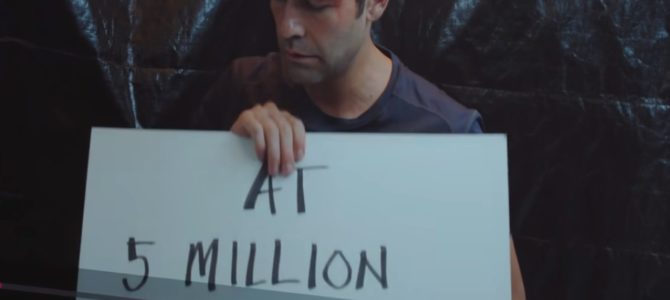
Netflix’s latest original mystery series “Clickbait” had all the makings of an awesome show. A compelling mystery with a solid cast – led by the always-great Zoe Kazan – it is a realistic integration of social media and the Internet’s role in contemporary life.
The show should have been a noteworthy, memorable piece of television. Instead, “Clickbait” is a bland, forgettable mess, over-reliant on shock value rather than satisfying storytelling. Ultimately, the show lives up to its title: alluring and exciting at first but lacking any substance and ultimately not worth the time expended.
The show occurs in the aftermath of a mysterious kidnapping of upstanding family man Nick Brewer (Adrian Grenier). A YouTube video goes viral, depicting Brewer holding signs declaring that he abuses women and will die when the video hits 5 million views. As Nick’s family and an ambitious detective attempt to unravel the mystery behind his disappearance, secrets are revealed as it becomes clear that no one really knows Nick – or each other.
In an interesting technique, each episode of the series follows a different person. The first episode follows Nick’s trainwreck sister Pia (Kazan), with whom he has a loving but contentious relationship. The episode shows a flash of brilliance, using a subjective perspective and limited scope to slowly reveal information to the audience and develop organic tension. Ultimately, though, the brilliance fades.
Even the novel storytelling device is undermined, as later episodes cut back to the main action, regardless of whether the focal character of the episode was at all involved. While this decision makes sense in terms of crafting a straightforward narrative, it entirely deflates the “Rashomon”-style ambiguity that made the show so compelling and unique at first.
Misplaced Focus
Further, where each episode elects to focus is baffling. Two latter-half episodes most clearly demonstrate this bewildering perspective. The fifth episode follows an ambitious reporter covering the case with a single-mindedness that overtakes any ethical or moral concerns he may have.
While the only narrative function of the episode is to uncover some information, the majority of its hour-long runtime is focused on this side character’s personality, complicated relationships, career goals, and how he feels about everything going on, with a surprising quantity of character development for so ultimately tangential a character.
Contrast this with two episodes later, as the penultimate episode is all about Nick’s sons Ethan and Kai. This is the first time the victim’s children are given a real voice. Does the story delve into how his father’s disappearance is affecting the adolescents? Is their pain, confusion, hope, fear, or betrayal explored in a meaningful way? No, although that would be compelling and fit nicely into the story.
Instead, the boys are primarily used as tools in the growing conflict between wife Sophie and sister Pia and as vessels to push forward the plot through their limited agency. Viewers end up knowing more about various tertiary figures of the narrative’s sidelines than the brothers, despite them being ostensibly more central and emotionally resonant characters.
Unsatisfying Conclusion
One of the most important aspects of a mystery is the conclusion; after all, it’s what the past several hours have been building to, and an unsatisfying conclusion can render the entire experience meaningless. Even though “Clickbait” went off the rails well before its conclusion, it ends on a profound anticlimax. It is nearly impossible to guess the true circumstances surrounding the kidnapping because the characters involved are not given nearly enough time to be compelling or to generate any emotional reaction other than bemusement and confusion.
The frustrating close is emblematic of a larger structural flaw that plagued the show: each plot development came entirely out of nowhere, with virtually no buildup or payoff. While the writers succeeded in successfully surprising viewers with each shift in the narrative, the randomness makes everything that came before feel hollow and meaningless. The conclusion tops this off to a frustrating degree.
Occasional Beauty
The show was technically proficient if uninspired, with some fantastic moments fit between standard but solid execution. The cinematography largely stays out of the way of the story and performances, which would be admirable if the story were engaging enough to sustain the eight-episode arc. There were a handful of truly gorgeous, evocative shots throughout, using an intelligence and thoughtfulness missing from the rest of the show.
The acting is in the same boat. No one is distractingly bad, but few actors rise above the inconsistent characterization and poor writing.
Kazan brings the troubled but sympathetic Pia to life excellently; her drive turned desperation to find and exonerate her brother is palpable, providing an effective emotional throughline to the series. Betty Gabriel is fantastic as Nick’s wife, Sophie, doubly impressive as she is victim to some of the worst instances of contradictory characterization. Gabriel infuses Sophie with the depth and nuance deeply needed to offset the poor writing choices.
“Clickbait” had the potential to be a smart, tense thriller, a “Rashomon” for the digital age. Sadly, its realistic treatment of social media and unique narrative structure is wasted in this banal, meandering mess. While the provocative concept and seeming originality may incentivize you to click, there’s nothing of substance at the end of the experience.









